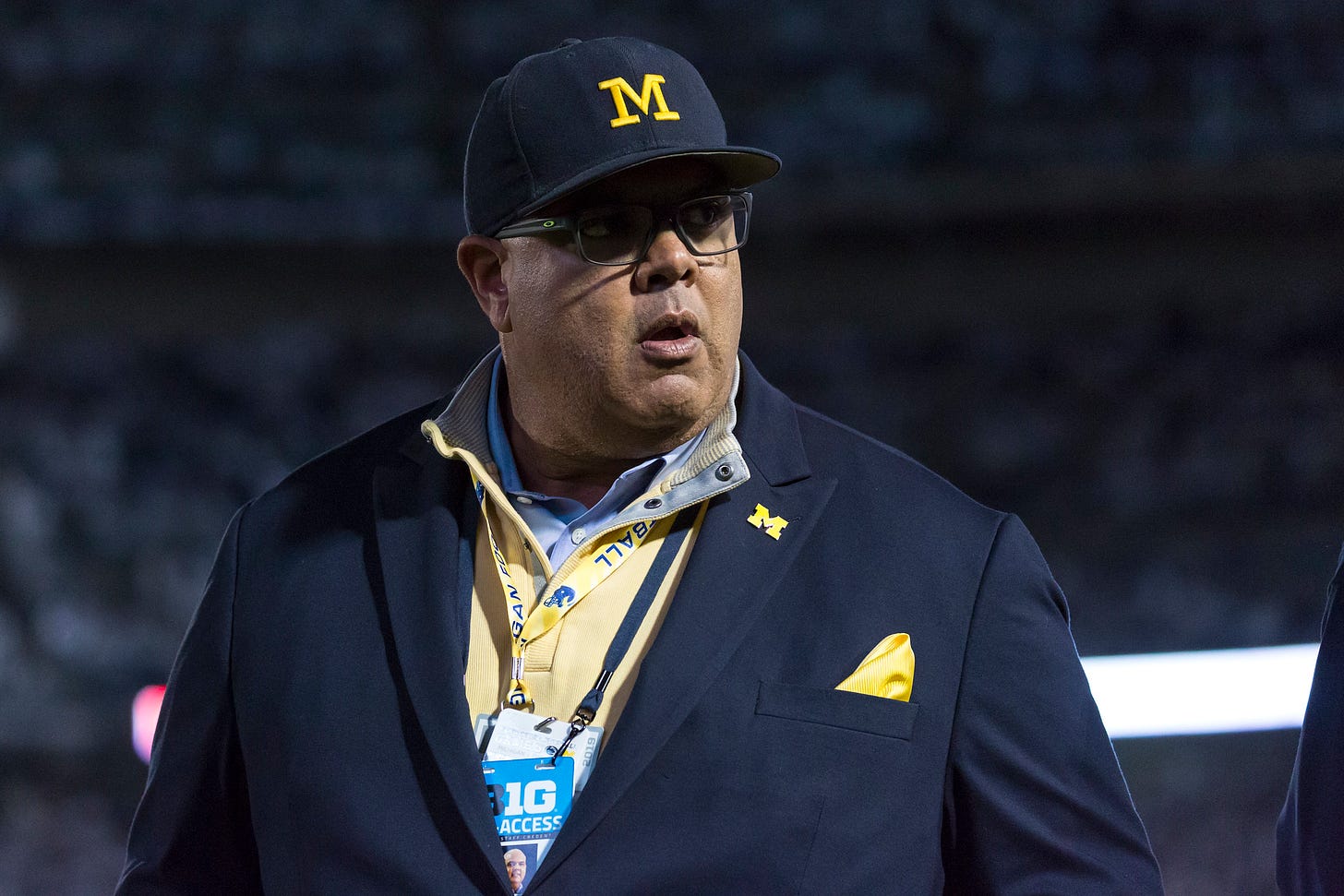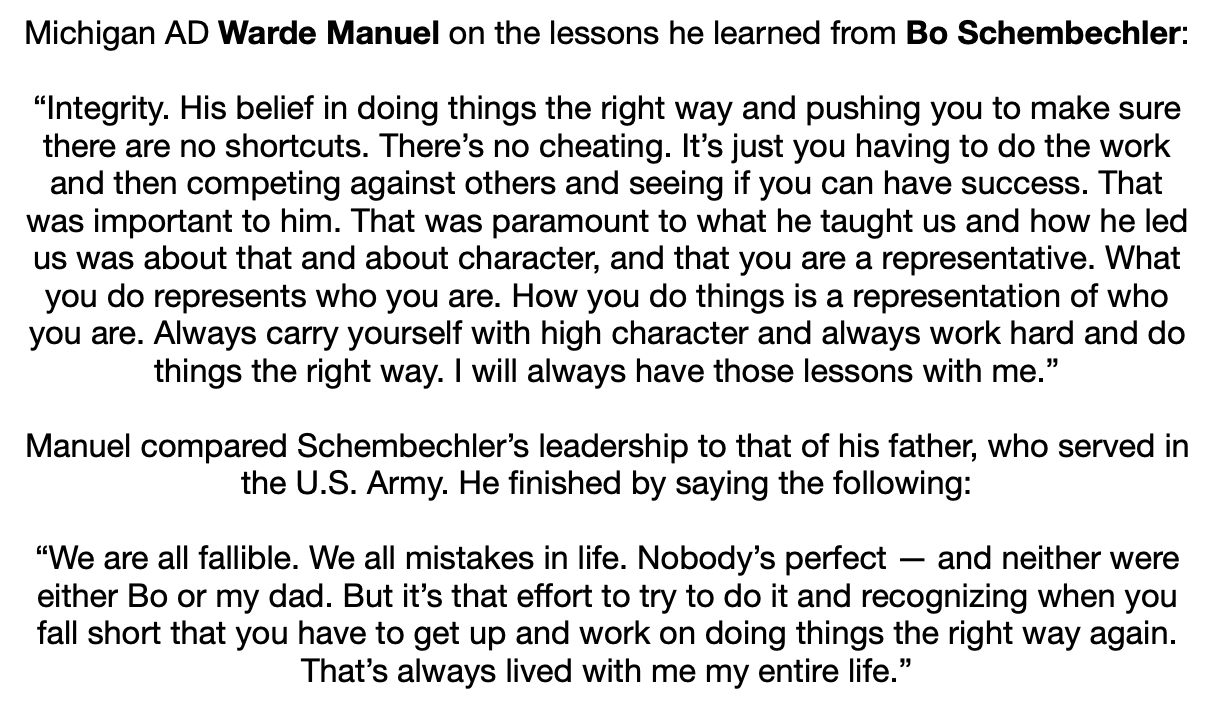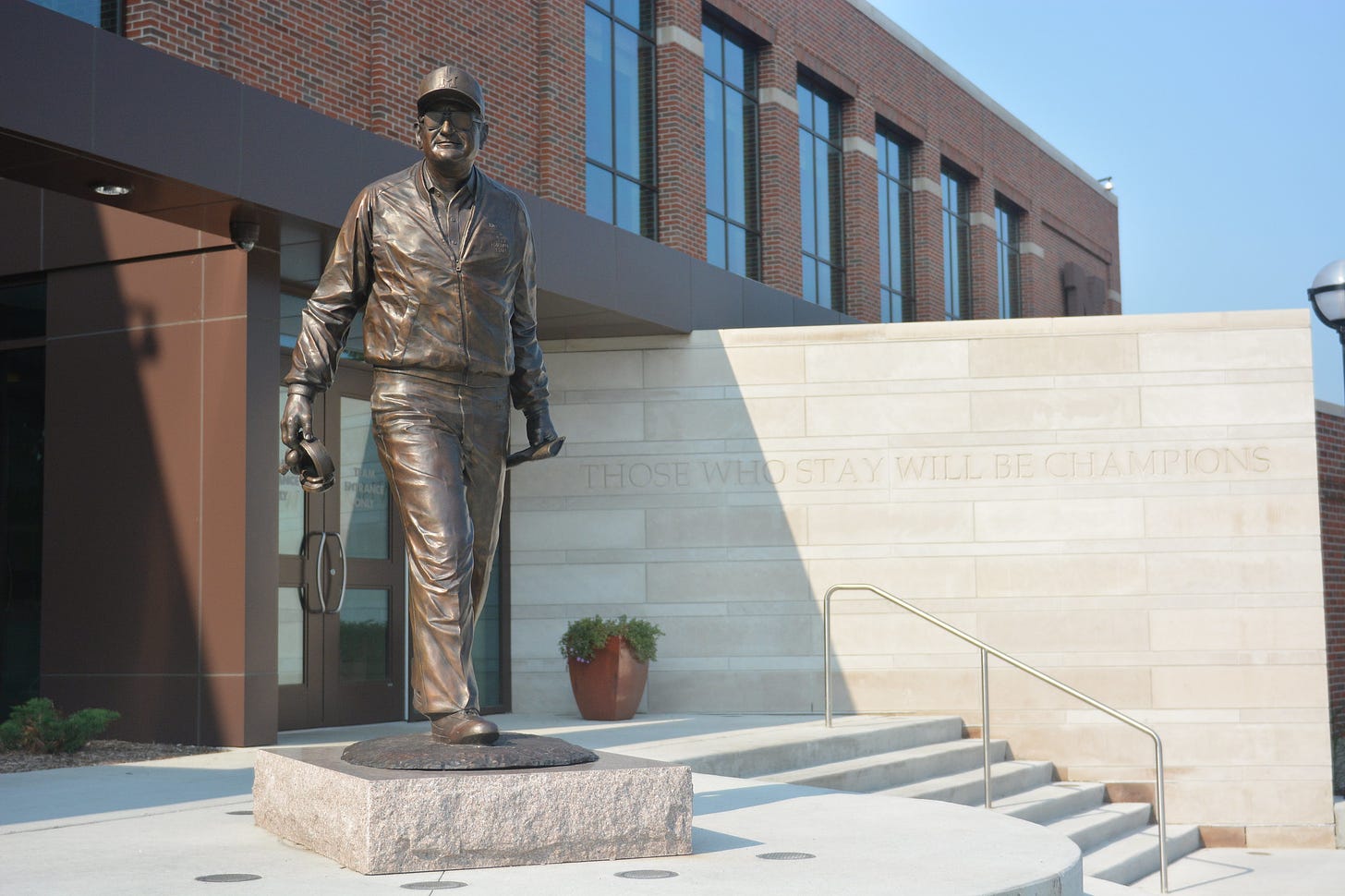Content warning: discussion of sexual abuse and misconduct.
They’re talking as if Robert Anderson never happened.
On June 1st, University of Michigan athletic director Warde Manuel appeared on the podcast “From the Chair with Mike Hamilton.” Hosted by the former University of Tennessee athletic director, who describes Manuel as a “longtime friend,” the show is an exercise in one college administrator lobbing softballs to another, ostensibly to teach us about leadership and the state of college athletics.
The episode opens with Hamilton asking Manuel how he wound up at U-M from New Orleans. This gave Manuel the opportunity to relive how impressed he — a star high school defensive tackle — and his family were with Bo Schembechler’s character during the recruiting process.
Hamilton, who says he “wasn’t planning to talk about Bo,” then calls Schembechler a “great leader,” “iconic coach,” and one of the “legends” of college football before asking Manuel what led to his role model’s success. If you weren’t already aware that Schembechler knowingly refused to stop a serial sexual assaulter operating within his own program for decades, you’d never realize it from the following conversation:
The Michigan Insider’s Alejandro Zúñiga, who was the first person to bring this conversation to the attention of the wider public, helpfully transcribed Manuel’s answer:
Hamilton follows up by asking if Manuel’s playing career overlapped with Jim Harbaugh’s — the answer is yes, as a Google search would’ve confirmed — before moving on to discussing the process of restructuring Harbaugh’s contract last year.1
I feel the need to reiterate that, by his own standards, Bo Schembechler failed as a leader and a human being. This is from his humbly titled book Bo’s Lasting Lessons: The Legendary Coach Teaches the Timeless Fundamentals of Leadership:
Every coach, every executive, every leader: They all know right from wrong. Even those Enron guys. When someone uncovers a scandal in their company, I don't think they can say, "I didn't know that was going on." They're just saying they're too dumb to do their job! And if they really are too dumb, then why are they getting paid millions of dollars to do it? They know what's going on.
So is this:
I do not believe in sitting on a problem. Because the longer you sit on that thing, the longer it'll irritate you.
And this:
Not making a decision is the worst thing you can do. So long as you feel you made the right decision based on the information you had at that time, there's no need to fret about it. If it fails, you'll know what to do next time.
Schembechler ignored several warnings that Robert Anderson, his team doctor, was sexually abusing his players, and in so doing allowed him to assault “countless” people before dying as a “beloved” member of the community.
Schembechler had more power to stop Anderson than anyone save perhaps former athletic director Don Canham — and then Schembechler became the AD himself from 1988-90. It’s impossible to square the “Bo’s Lasting Lessons” Schembechler with the real man unless you willfully pretend the Anderson scandal didn’t happen in the way it was exhaustively documented in the WilmerHale report.
The so-called integrity of Bo Schembechler extended as far as his self-interest. He cultivated a cult of personality among the people who could serve him well: his best players, fellow coaches, friendly media members, and the fans.
When an awful and embarrassing scandal could’ve come to light, however, he valued the appearance of an ideal football program over the well-being of his own players — and, it must be noted, Anderson seemed to target those who weren’t in Schembechler’s inner circle.
Schembechler didn’t just “fall short,” to use Manuel’s words. He made a conscious choice to allow others to be subjected to severe harm and trauma. He never acknowledged this, let alone reckoned with his actions, before his death.
To say that “nobody’s perfect” fails to cover Schembechler’s moral shortcomings is a titanic understatement.
It’s becoming increasingly clear that a sizable portion of the athletic department has no intention of acknowledging the real Schembechler or scaling back his influence on their programs.
The statue of Schembechler still stands in front of the football facility that bears his name. His slogans, from “the team, the team, the team” to “those who stay will be champions,” are omnipresent throughout the athletic department, even in the women’s programs whose creation he fought after Title IX passed.
Meanwhile, notable figures either working for or associated with Michigan athletics continue to praise Schembechler as a leader and role model: Jim Harbaugh, Jim Brandstatter, Dan Dierdorf, Desmond Howard, and now the head of the entire department.
If there’s been any push from university leadership to stop this appalling behavior, it hasn’t been respected. The school has a terrible recent track record of addressing sexual misconduct. In the current leadership vacuum, the voices of Schembechler’s supporters fill the void.
The survivors of Robert Anderson’s abuse and victims of sexual misconduct everywhere deserve better. There’s no major figure in the school openly advocating for them. The vast majority of media covering the football program or athletic department has evidently moved on. The only two news hits covering Manuel’s comments are a paywalled Detroit Free Press story and a commentary piece from the National Review(!?!).
For those who find this unacceptable, the way to be heard — perhaps, I hope — is through direct communication. There will be no meaningful response until those in charge of the university feel public sentiment turning against them.
You can email Warde Manuel’s office at WardeManuelAD@umich.edu or call it at 734-764-9416. You can do the same to the regents at umregents@umich.edu and/or contact individual regents:
Jordan Acker: jbacker@umich.edu, (248) 483-5000
Michael Behm: mjbehm@umich.edu, (810) 234-2400
Mark Bernstein: mjbern@umich.edu, (248) 865-0877
Paul Brown: pwb@umich.edu, (734) 730-1077
Sarah Hubbard: regenthubbard@umich.edu, (517) 853-1236
Denise Ilitch: dilitch@umich.edu
Ron Weiser: don’t bother
Katherine White: kewhite@umich.edu, (313) 577-1054
Michigan cannot move past the sins of its past without acknowledging them in the present. Otherwise, they’re doomed to repeat them in the future.
I listened to the entire episode so you wouldn’t have to do so. Please like and subscribe.







